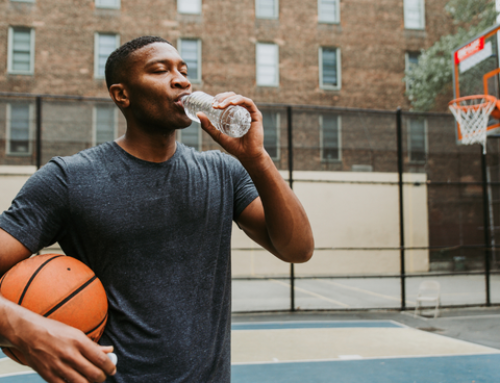12 Must-Know Hydration Rules for Athletes
Practice sessions for fall sports begin soon, right smack in the middle of the summer heat.
Aside from preparing for the upcoming season and the opponents who come with it, you need to be aware of another enemy lurking on the sidelines. It’s called dehydration and it can sneak up on both athletes and non-athletes (e.g., coaches and training staff) and cause various health issues, from muscle cramps to life-threatening heat-induced illnesses such as strokes and heart-related problems.
The best defense against dehydration on and off the field is water.
Hydration is the proper balance of fluids and minerals in the body. Below are some facts and tips on how to stay hydrated on the field and in the weight room to remain healthy and perform at your mental and physical best.
- Keep a water bottle handy before, during and after workouts.
- Adequate hydration gives muscles a fuller appearance. Aim for 1-1/2 to 2 liters (six to eight glasses) daily, and consume plenty of water-based foods such as fruits and vegetables to keep muscles looking fuller.
- Water helps transport nutrients to muscles for recovery and growth.
- Water aids muscle contraction. Protein synthesis is also enhanced with hydration.
- Even a slight water loss contributes to decreased physical energy and mental focus and less productive workouts.
- Water consumption boosts metabolism. A faster metabolism efficiently helps burn fat and calories, especially in conjunction with weight training—resulting in more muscle and less body fat.
Water Guidelines on the Field
- Be sure your “water tank” is filled before hitting the field. Don’t wait until immediately before practice or a game to find out if you’re hydrated, especially on a hot day. Adequate hydration is generally indicated by urine color, with clear urine showing you’re well hydrated and yellow or orange-colored urine meaning you are dehydrated.
- Thirsty? Too late—you’re already dehydrated. Don’t wait until you’re thirsty to drink more water.
- Slight water loss can impair sports performance and can lead to poor judgment or lack of awareness and alertness and/or less energy on the field.
- Weigh yourself before and after workouts, practices and games. Health professionals say if you’ve lost about 2% of your body weight following high-intensity physical activity, you’re dehydrated and susceptible to heat stroke.
- Water first, then sports drinks. Water is generally advised as the primary beverage in the first hour of practice or a game in hot conditions. Carbohydrate-electrolyte sports drinks help replace electrolytes (e.g., minerals such as sodium and potassium) lost from excessive perspiration after an hour or more of intense activity in hot and humid conditions.
- Avoid overhydrating. The opposite of dehydration is hyper-hydration, also known as hyponatremia. It occurs when too much water is consumed in proportion to the body’s electrolyte content, and it can be as bad as drinking too little water. Consult your school’s athletic trainer or team doctor if you are unsure about the right amount of water intake versus electrolytes for your body during practices and games in hot weather.
RECOMMENDED FOR YOU
MOST POPULAR
12 Must-Know Hydration Rules for Athletes
Practice sessions for fall sports begin soon, right smack in the middle of the summer heat.
Aside from preparing for the upcoming season and the opponents who come with it, you need to be aware of another enemy lurking on the sidelines. It’s called dehydration and it can sneak up on both athletes and non-athletes (e.g., coaches and training staff) and cause various health issues, from muscle cramps to life-threatening heat-induced illnesses such as strokes and heart-related problems.
The best defense against dehydration on and off the field is water.
Hydration is the proper balance of fluids and minerals in the body. Below are some facts and tips on how to stay hydrated on the field and in the weight room to remain healthy and perform at your mental and physical best.
- Keep a water bottle handy before, during and after workouts.
- Adequate hydration gives muscles a fuller appearance. Aim for 1-1/2 to 2 liters (six to eight glasses) daily, and consume plenty of water-based foods such as fruits and vegetables to keep muscles looking fuller.
- Water helps transport nutrients to muscles for recovery and growth.
- Water aids muscle contraction. Protein synthesis is also enhanced with hydration.
- Even a slight water loss contributes to decreased physical energy and mental focus and less productive workouts.
- Water consumption boosts metabolism. A faster metabolism efficiently helps burn fat and calories, especially in conjunction with weight training—resulting in more muscle and less body fat.
Water Guidelines on the Field
- Be sure your “water tank” is filled before hitting the field. Don’t wait until immediately before practice or a game to find out if you’re hydrated, especially on a hot day. Adequate hydration is generally indicated by urine color, with clear urine showing you’re well hydrated and yellow or orange-colored urine meaning you are dehydrated.
- Thirsty? Too late—you’re already dehydrated. Don’t wait until you’re thirsty to drink more water.
- Slight water loss can impair sports performance and can lead to poor judgment or lack of awareness and alertness and/or less energy on the field.
- Weigh yourself before and after workouts, practices and games. Health professionals say if you’ve lost about 2% of your body weight following high-intensity physical activity, you’re dehydrated and susceptible to heat stroke.
- Water first, then sports drinks. Water is generally advised as the primary beverage in the first hour of practice or a game in hot conditions. Carbohydrate-electrolyte sports drinks help replace electrolytes (e.g., minerals such as sodium and potassium) lost from excessive perspiration after an hour or more of intense activity in hot and humid conditions.
- Avoid overhydrating. The opposite of dehydration is hyper-hydration, also known as hyponatremia. It occurs when too much water is consumed in proportion to the body’s electrolyte content, and it can be as bad as drinking too little water. Consult your school’s athletic trainer or team doctor if you are unsure about the right amount of water intake versus electrolytes for your body during practices and games in hot weather.












